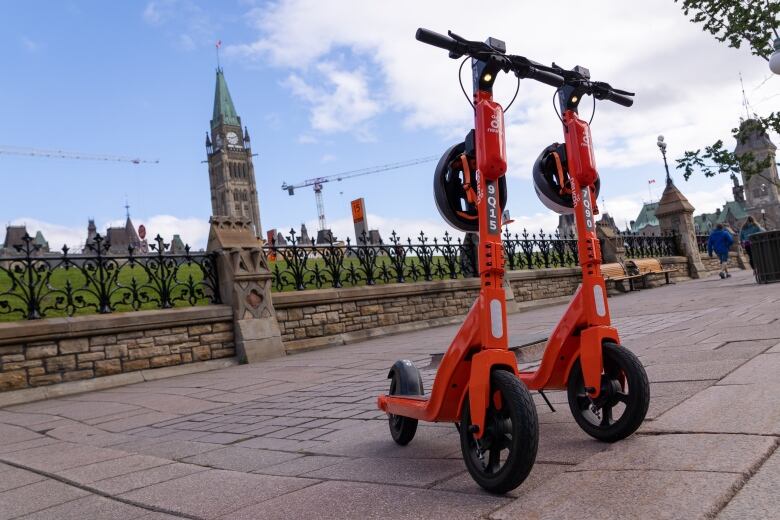Longer e-scooter season could start April 15
Final season of pilot project to run 20 hours a day until Nov. 15

The City of Ottawa sayse-scooters can be ready to roll a month earlier than last year for more hours a day.
The 2024 season will be the fifth and final year of thepilot project first set up by the province in 2020.
Ottawa'sinterim general manager of planningViviChi had been given the power by city council to extend the pilot if she was satisfied with the 2023 seasonand she said in a memo on Tuesday it would be appropriate to continue.
Birdand Neuron have offered e-scooters before and will be offered a contract extension for 2024, according to the city. They can start April 15, weather permitting, and run until Nov. 15.
Chisaidlast year's six-month season from mid-May to mid-Novemberwasabout 40 per cent longer than in 2022 and offered more than twice the riding area.
Riders went an average of just over two kilometres a trip last year, taking about 15 minutes a ride. July was the busiest month and evenings were the busiest time of day.
About 50,000 people tooknearly 180,000 trips in 2023, more than doublethe number of tripsin 2022. The number of trips was even higher in 2020 and 2021,with a number of safety-related changes made after the 2021 seasonand a third provider not returning.
"I think that we've seen that the program is a success," said Coun. Catherine Kitts, vice-chair of the transportation committee."I think it's become a really good option for travel in the downtown core."
Anotherchangeislonger hours to better match the transit system: e-scooters can run three more hours a daybetween 5 a.m. and 1 a.m. It was generally 6 a.m. to 11 p.m. last year, with a few trials of longer hours.
"That change in and of itself is going to be, I think, absolutely massive," saidAustin Spademan, head of government relations at Bird Canada.
He said one of the complaints it had was from late-night workers who weren't able to ridee-scooters home when they finished their shifts.
"Sobriety technologies" will now be mandatory for all rides after 11 p.m., which Spademan said will include in-app puzzles and a road safety quiz riders will have to pass.
The city said hours would be different in the ByWard Market, but did not say what they will be.
Isaac Ransom,Neuron Mobility's headof corporate affairs, told CBC the company is also excited about the earlier start and longer hours, but noted Ottawa has the unique distinction of being the only Canadian city with an e-scooter curfew.
"Twenty-five per cent of our trips do happen during the later hours of the evening, and primarily these are people who are working in the nighttime economy," he said.
Fees cut
More changes includepotentiallyallowing each company to have up to 600e-scooters on the roads,up from 450 last year, cutting a 10-cent user fee because the revenue-neutral program made $43,000and exploring options tohavehelmets accessible to all riders.
Neuron already provides shared helmets, but riders had to request their ownfrom Bird Canada.
"We can offer helmets on all scooters, but there's a huge amount of the population that aren't comfortable using a shared helmet," said Spademan, adding that they'll be available on a percentage of their fleet.

Last year, Bird Canada had expressed concerns about Ottawa's restrictive parking rules, something that doesn't appear to be changing for this season.
"It'slike that analogy from Disney where people are only willing to walk [30] steps to a garbage can and if you don't have one available, they'll just give up," said Spademan.
"It's the same with using micromobility. If you don't have enough parking locations where people actually want to park the devices, they just won't use it and they'll go back to using their car."
Ransom said Ottawa is also unique in that it tends to have narrower sidewalks and more historical elements, but that Neuron users would be able to find a parking spot onevery street corner.
Kitts said thechanges over the years have been made with the goal of improving safety.
She said while sheunderstands why the companies might be frustrated by Ottawa's restrictions,the city isresponding to concerns they've heard from the community, such as scooters being left "willy-nilly" or being operated on sidewalks.
After this final pilot year, the city said it will be up to the provinceto extend the pilot, make e-scooters a permanent fixture or discontinue them.
The city is also going to run a campaign about safety and etiquette for all e-scooter riders, including people who own one and don't have the kinds of restrictions built into these rentals, after hearing from its accessibilitycommittee.













_(720p).jpg)


 OFFICIAL HD MUSIC VIDEO.jpg)
.jpg)



























































































